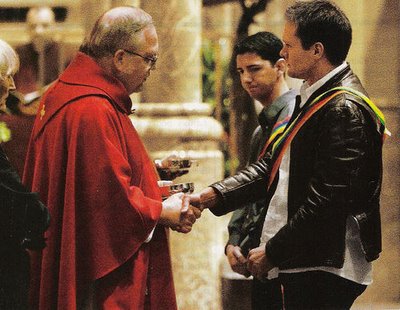 When the U.S. Catholic bishops meet in Baltimore Nov. 13-16, they will be asked to vote on guidelines for ministry to those with homosexual inclinations.
When the U.S. Catholic bishops meet in Baltimore Nov. 13-16, they will be asked to vote on guidelines for ministry to those with homosexual inclinations.The proposed document clearly reaffirms and explains church teaching against any sexual activity -- homosexual or heterosexual -- that takes place outside marriage, and it says authentic ministry must be based on that teaching. But it also says a homosexual inclination is not itself sinful and those who are homosexually inclined "must be accepted with respect, compassion and sensitivity."
It sharply condemns hatred or "violent malice in speech or action" against homosexuals. "Those who would minister in the name of the church must in no way contribute to such injustice," it says.
The 23-page document, prepared by the Committee on Doctrine of the U.S. Conference of Catholic Bishops, is titled "Ministry to Persons With a Homosexual Inclination: Guidelines for Pastoral Care."
Despite the title, only about one-fifth of the document is devoted specifically to pastoral care guidelines; the larger and more important part of the text is devoted to the framework of church teaching within which such pastoral care is set. It acknowledges that the teaching is not readily accepted in many quarters.
Addressing general principles about human sexuality, the document says, "The purpose of sexual desire is to draw man and woman together in the bond of marriage, a bond that is directed toward two inseparable ends: the expression of marital love and the procreation and education of children. ... This is the order of nature, an order whose source is ultimately the wisdom of God."
"By its very nature," the document adds, "human sexuality finds its proper fulfillment in the marital bond. Any sexual act that takes place outside the indissoluble and lifelong bond of marriage does not fulfill the proper ends of human sexuality. ... It is disordered in that it is not in accord with this twofold end and is thus morally wrong."
"There are a variety of acts, such as adultery, fornication and contraception, that violate the proper ends of human sexuality," it says. "Homosexual acts also violate the true purpose of sexuality. They are sexual acts that cannot be open to life. Nor do they reflect the complementarity of man and woman that is an integral part of God's design for human sexuality."
The document distinguishes sharply between homosexual acts and having a homosexual inclination. "While the former is always sinful, the latter is not. To the extent that a homosexual tendency or inclination is not subject to one's free will, one is not morally culpable for that tendency," it says.
"Simply having the tendency is not a sin," though one may sin by voluntarily entertaining homosexual temptations or acting on them, it says.
Following the lead of a 1986 Vatican document that drew extensive criticism from gay rights groups, the document reaffirms church teaching that "the homosexual inclination is objectively disordered."
"It is crucially important to understand that saying a person has a particular inclination that is disordered is not to say that the person as a whole is disordered. ... Sometimes the church is misinterpreted or misrepresented as teaching that homosexual persons are objectively disordered," it says.
The church is only saying that the "inclination to homosexual acts, like every inclination to sin, is disordered," but the person with any such inclinations "retains his or her intrinsic human dignity and value," the document says.
Throughout its treatment the document avoids use of the term "orientation," referring instead to a homosexual "inclination" or "tendency."

Following classic moral theology on the consistent practice of virtue as an aid to control disordered inclinations or passions, it says: "The passions are not fixed, unchanging obstacles to moral action. They do not simply have to be repressed in order for one to act morally. Repeated good actions will modify the passions that one experiences. In fact, passions that have been properly disposed aid one in acting well."
The document stresses the importance of "bonds of friendship," especially within families, as a means of support for living a full human life. "There can be little hope of living a healthy, chaste life without nurturing human bonds," it says.
It says those who minister in the name of the church "should encourage healthy relationships between persons with a homosexual inclination and other members of their families." It says the local church community should also be a place where such people experience friendship and support.
The "overriding aim" of church ministry to those with a homosexual inclination is always "fostering the greatest possible friendship with God," which is found in holiness, the document says.
It criticizes the "moral relativism in our society" and "widespread tendency toward hedonism" in American culture.
"The pervasive influence of contemporary culture creates, at times, significant difficulties for the reception of Catholic teaching on homosexuality," it says.
On specific concerns of pastoral care for those with a homosexual inclination, the document cites the importance of their "full and active participation" in church life and their need to be welcomed by the local church community, but it warns that the church should not give roles of leadership or service to members "whose behavior violates her teaching."
It says those who carry out the church's ministry must not use their leadership positions to advocate views contrary to church teaching.
It calls for outreach to homosexuals who have been alienated from the church and for church policies that explicitly reject "unjust discrimination and harassment" against homosexuals.
It says catechesis should reflect church teaching on sexuality and church teaching against unjust discrimination.
It urges a full sacramental life and sound spiritual direction as aids on the path to holiness.
It warns, however, against the promotion of "so-called same-sex 'marriages' or any semblance thereof, including civil unions that give the appearance of marriage." Church ministers may never bless or promote such unions, it says.
It also says the church does not support the adoption of children by same-sex couples, but adds that the church should not refuse to baptize such children if there is "a well-founded hope" that they will be raised in the faith.
The document calls for the church to see that "pastoral support and psychological services" are readily available to homosexually inclined persons, especially adolescents struggling with those issues, and their families.
Professionals who provide counseling services "should be chosen carefully to ensure that they uphold the church's understanding of the human person," it says.
from The Boston Pilot
No comments:
Post a Comment